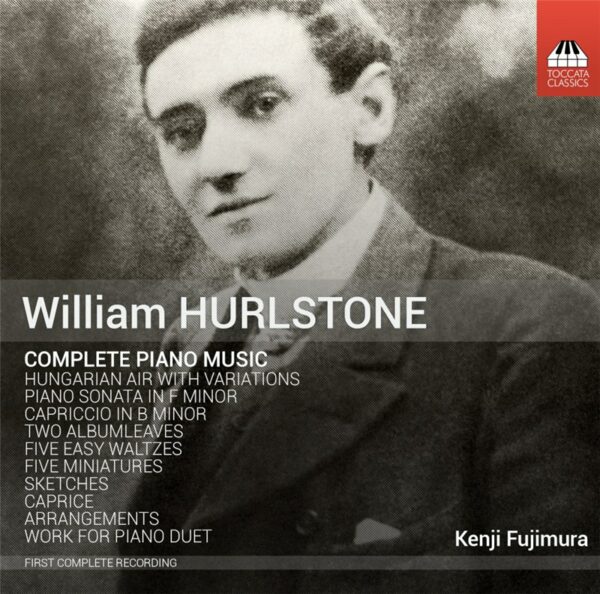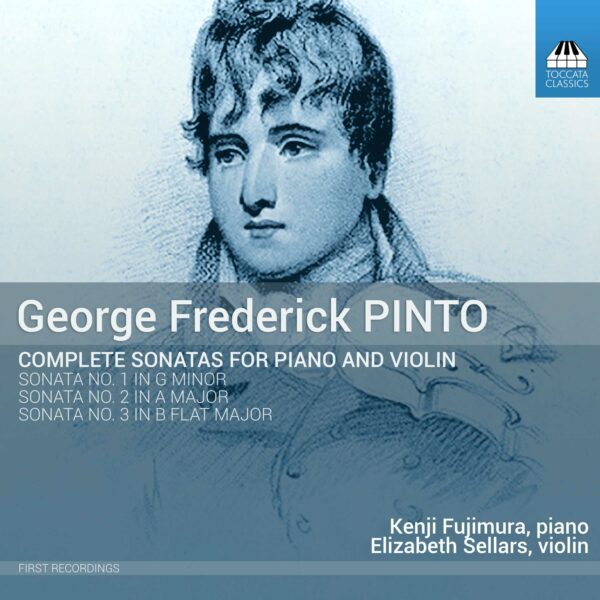William Hurlstone: Complete Piano Music
London-born William Yeates Hurlstone was only 30 when he died, in May 1906, and yet the music he was able to compose during his short life shows remarkable accomplishment. This CD presents the first-ever recording of his complete piano music, which develops from confident childhood essays, takes on board the influences of Chopin and Brahms, and matures into an assured and natural style balancing lyricism and drama.
Kenji Fujimura, piano
Listen To This Recording:
- 5 Miniatures: I La Simplicite
- 5 Miniatures: II Valse Miniature
- 5 Miniatures: III Negro Song
- 5 Miniatures: IV Rustic Song
- 5 Miniatures: V Alla Mazurka
- Capriccio in B minor
- Sketches: I March
- Sketches: II Allegretto
- Sketches: III untitled
- Sketches: IV Mazurka
- Sketches: V La Fete
- Sketches: VI Tambourin
- 2 Album leaves: I Aria
- 2 Album leaves: II Demons’ Dance
- Caprice
- Etude in F flat major
- Sielanka
- Tarentelle for the left hand
- Hungarian Air with Variations: Hungarian Air: Theme
- Hungarian Air with Variations: Var. 1
- Hungarian Air with Variations: Var. 2
- Hungarian Air with Variations: Var. 3
- Hungarian Air with Variations: Var. 4
- Hungarian Air with Variations: Var. 5
- Hungarian Air with Variations: Var. 6
- Hungarian Air with Variations: Var. 7
- Hungarian Air with Variations: Var. 8
- Hungarian Air with Variations: Var. 9
- Hungarian Air with Variations: Var. 10
- Hungarian Air with Variations: Var. 11: Finale
- 5 Easy Waltzes, Op. 1: No. 1
- 5 Easy Waltzes, Op. 1: No. 2
- 5 Easy Waltzes, Op. 1: No. 3
- 5 Easy Waltzes, Op. 1: No. 4
- 5 Easy Waltzes, Op. 1: No. 5
- Work for piano duet
- Piano Sonata in F minor: I Allegro
- Piano Sonata in F minor: II Andante ma non troppo
- Piano Sonata in F minor: III Andante – Allegro vivace


Fanfare Magazine :
‘Finally, Toccata Classics expands our knowledge of William Hurlstone, an English composer who died at the tender age of 30 in 1906. Some readers may be familiar with the Piano Sonata; Toccata prefaces Fujimura’s performance with no fewer than eleven first recordings. Fujimura is a most powerful advocate for this incredibly strong music.’
—Colin Clarke, Fanfare Magazine, Want List of Colin Clarke, November/December 2015
MusicWeb International :
‘I was extremely impressed and consider it to be one of the best British piano sonatas in the repertoire. […]
All these works are played with understanding, sympathy and technical prowess by the pianist Dr. Kenji Fujimura. He is a musical polymath, being composer, performer and academic. Clearly much study and preparation has gone into this recording, bearing in mind that many of the pieces are still in manuscript and remain unpublished. […]
Paul Conway’s notes are excellent and make a fascinating essay-length introduction to William Hurlstone’s piano music.
This is a must-have CD for all British music enthusiasts. I have been waiting for this release for many years and have not been disappointed. Every track (even the juvenilia) on this disc is worthy of our attention. A great investment.’
—John France, MusicWeb International
Gramophone Magazine :
‘William Hurlstone died in 1906 at the tragically early age of 30 but left behind a substantial body of work. Australian pianist Kenji Fujimura has a PhD on the subject and, while I usually run a mile if I see an artist billed as ‘Prof’ or ‘Dr’, in this case scholarship and musicianship are on a par. Most of the music here is early and slight; some is unexpected (an arrangement of Stephen Heller’s Tarantelle for the left hand). Two pieces are outstanding: Lisztians will recognise the theme of Hurlstone’s Hungarian Air with Variations from its use in the second (C sharp major) section of the Hungarian Rhapsody No. 6; the 11 brief and highly contrasted variations, more englisch than ungarische, would make a delightful sequence in any recital. From three years earlier, the unpublished Piano Sonata in F minor (1894)—the only work on the disc to have previously been recorded (Mark Bebbington—Somm, 10/10)—is a remarkable creation for an 18-year-old. If Hurlstone’s warmly lyrical, virtuoso Piano Concerto appeals (Eric Parkin from the late 1970s—Lyrita, 2/80, 1/08) then you’ll enjoy the Sonata.’
—Jeremy Nicholas, Gramophone Magazine, September 2015
Music & Vision :
‘Kenji Fujimura extracts every ounce of fantasy and imagination from this wistful yet intriguing repertoire, and his sensitivity and lightheartedness make the music yield all its youthful zest and fresh-faced poetry.’
—Gerald Fenech, Music & Vision